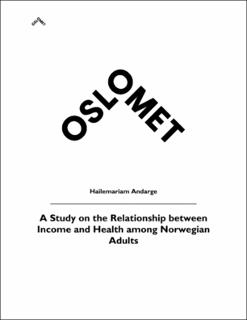A Study on the Relationship between Income and Health among Norwegian Adults
Master thesis
Published version
Permanent lenke
https://hdl.handle.net/11250/3097514Utgivelsesdato
2023Metadata
Vis full innførselSamlinger
Sammendrag
This study analyses the relationship between income and health among Norwegian adults aged 40-67 years. Its main aim is to assess the effect of individual differences in income on their health status and to better understand the association between income and health. It used data from the Norwegian Life Course, Ageing and Generation Study (NorLAG) conducted in 2002. Data were collected through computerized telephone interviews (CATI) and self-administered postal questionnaires. A total of 4183 sampled respondents aged 40-67 years were selected using a multistage sampling technique. Univariate, bivariate, and multivariate statistical analyses were performed. The results of this study show that there is a statistically significant direct association between income and health. However, income was found to have a weak positive correlation with health and a small effect on changes in health status. The results also show that differences in the other socioeconomic status variables such as education, age and gender can influence health status. Higher education was found to be associated with better health and lower education with poor health. Older adults are associated with poorer health, while the opposite is true for younger adults. Regarding gender, adult men are associated with relatively better health than their counterparts. Education is weakly positively correlated with health, while age and gender are weakly negatively correlated. In addition, the results of multiple regression analysis showed that income and other socioeconomic status variables together explained less than 10% of the variation in health. Income and education account for two-thirds (the majority) of all variations in health status, while age and gender account for the rest. Income alone accounts for only less than 3% of the variation in health status. Based on these results, I conclude that income and health are weakly positively related among Norwegian adults, and that income has little effect on variability in health. Contrary to expectations, income is not the strongest predictor of variation in health status, but education is.
